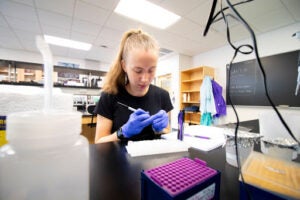Contact Information
Lydia Slattery
Media Relations Specialist
Phone: 563-387-1417
Luther College students lead research projects to investigate gene expression and function
 This summer, Luther College students Anneke Knauss, Hamid Ahmed and Julia Schulte collaborated with Brian Hiester, visiting assistant professor of biology, using C. elegans (a type of worm) to investigate the expression and function of a family of genes. Their research examined how stress impacts gene expression and how reduced expression impacts an organism’s development. Their findings can help to explain how human diseases form, such as cancer and Alzheimer’s disease. Knauss and Schulte worked together on an experiment studying the effects of heat stress, while Ahmed researched the consequences of protein deletion.
This summer, Luther College students Anneke Knauss, Hamid Ahmed and Julia Schulte collaborated with Brian Hiester, visiting assistant professor of biology, using C. elegans (a type of worm) to investigate the expression and function of a family of genes. Their research examined how stress impacts gene expression and how reduced expression impacts an organism’s development. Their findings can help to explain how human diseases form, such as cancer and Alzheimer’s disease. Knauss and Schulte worked together on an experiment studying the effects of heat stress, while Ahmed researched the consequences of protein deletion.
“We tested two types of genes and four types of complementary DNA (cDNA),” said Schulte. “We made the cDNA ourselves. We tested the expression of the different cDNAs against a normal population of worms using heat shock. Then, we harvested the worms to see if their genes were different from those that were not under stress.”
Conducting this research was not only personally beneficial, it has important applications to real world problems. For example, Ahmed’s research on unregulated proteins in worms can help inform how uncontrolled proteins in humans may lead to serious diseases.
“The protein I studied essentially takes care of other proteins,” said Ahmed. “Because proteins need to be turned over every now and then, if this protein does not do its job, old proteins can start messing up the cells. You can connect this to Alzheimer’s disease, to cancer, or other diseases that result from dysregulation.”
It’s the kind of real-world research Hiester is proud to facilitate. He wants his students to have the opportunity to develop their own scientific ability and to do meaningful research in an actual lab setting.
“Ultimately, for all my research students, I want to build up their sense of independence–their ability to work on their own, to develop their ability to design and execute their own experiments. I really see this as a training experience,” said Hiester. “For a lot of these students, it’s their first opportunity to conduct real intensive research. I want to give them a taste of what it’s like and give them that opportunity to choose whether or not research is something they want to pursue in the future.”
The process was tedious, but these students found the research to be personally rewarding. They say the experience was insightful and broadened their career interests.
“From this experience, I learned I’m interested in a lot more facets of biology than I otherwise thought–which is good and bad,” said Knauss. “It’s kind of bad because now I have less of a narrow lens going forward, but it’s also kind of good because I feel like I would be satisfied going in a lot of different directions.”
Hiester and his students plan to share their findings by presenting their research on campus and at conferences. The Hiester lab research contributes to a larger conversation being had among professional researchers around the world, and for Hiester, summer research is an opportunity to plug into that global discussion.
“You kind of think of scientific research as trying to build an ocean through little tiny drops of water,” said Hiester. “We’re just trying to contribute maybe a couple drops of water into that, and over time, contribute to our overall understanding. If we can understand a little bit more about how these genes work, that might inform us about how genes in mammals are functioning, and how dysregulation of those genes can contribute to certain human diseases.”
Luther’s Summer Student/Faculty Collaborative Research program provides opportunities for students to engage in collaborative research projects with Luther faculty members. It is a chance for students to develop their research skills; actively learn in Luther’s natural areas, precision labs or independently; and it provides an opportunity to dig deep and gain expertise in a specific facet of a larger field of study.
About Luther College
Luther College is home to more than 1,800 undergraduates who explore big questions and take action to benefit people, communities and society. Our 60+ academic programs, experiential approach to learning and welcoming community inspire students to learn actively, live purposefully and lead courageously for a lifetime of impact.
Contact Information
Lydia Slattery
Media Relations Specialist
Phone: 563-387-1417